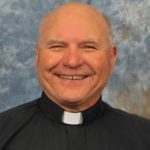By Micah Kiel
This is the first in a series by St. Ambrose University faculty in the Theology Department about concepts from their new course: “Just Theology.”
In our new course at St. Ambrose called “Just Theology,” their first paper asked the students to: “evaluate the relationship between belief in God and just action in the world.” I want the students to think about what justice means, and how that relates to their faith in a practical way.

Catholic social teaching tells us that the injustices in our world today are structural, or social, in nature. There is certainly individual sin in our world. But problems such as poverty, homelessness, environmental degradation and racism are not simply the result of bad choices. Both Scripture and the Catholic tradition talk about ways in which sin, or injustice, can be structural.
Structural injustice is baked into the system; the whole society is the problem. I had the students read an article about cobalt mines in the Congo in Africa. Cobalt is an essential component of lithium-ion batteries that power our laptops, tablets, mobile phones and hybrid cars. The mining conditions in Congo are horrific. There are no safety regulations; deaths are common. The cobalt is washed in the local rivers, which pollutes the water sources for many towns, poisoning children. The situation is unjust.
The question becomes: whose fault is it? We might blame trans-global companies (Apple, Samsung, etc.) for exploiting these workers. We could blame the Congolese government. But we also should blame ourselves, the consumers of these products, who want them as cheaply and expeditiously as possible. The cobalt mines in Congo demonstrate how injustice is structural, infused into a system marked by capitalism, greed and racism. We can’t point a finger in just one direction to explain the problem. We may not wake up in the morning and say, “You know what? I’d like to ruin the life of someone in the Congo today.” But when we open up Facebook on our phone first thing in the morning, that’s exactly what we’ve done. The problem is structural. If we participate in that structure, we are complicit, whether we think about it or not.
In the past few weeks, the Sunday lectionary Old Testament readings have been coming from Amos. Amos is very interested in structural injustice. He looks out at the society in which he lived (the 8th century BCE) and sees a social structure skewed against the poor. Unjust scales and monetary systems are exploited by the rich to keep the poor oppressed. The people are not necessarily doing it consciously; they’re just going about their business. But this only demonstrates the structural nature of the problem, which is why Amos calls for justice to roll down like waters, a deluge of justice to wash the whole system away.
By recognizing structural justice, it has allowed the students to explore the differences between charity and justice. If all we do is engage in charity, we are not getting at the root of the problem. Thinking about justice in a structural way should seek deep solutions that address the causes of injustice. The textbook for my class, “Globalization, Spirituality, and Justice,” by Daniel Groody, uses a story to explain the difference:
Imagine a small village with a river running through it. One day, three bodies float down into the river, two severely beaten and one dead. The villagers fish the bodies out, nurse the injured back to health and bury the dead. The next week, three more bodies appear and they do the same. The next week, three more bodies. Charity is caring for these bodies. Seeking justice would ask: Why are these bodies floating into our town in the first place? Seeking justice would require the villagers to go up the river looking for causes and solutions.
Charity and justice are related, but charity must always be animated by a bigger commitment to justice. Charity is something that one does out of love, but justice pertains to the fundamental dignity that all humans share equally.
These ideas are challenging, both for my students and for myself. Because the problem is structural, our belief in God can’t be animated only by charity. Faith also requires a commitment to address root causes in order to build a more just world.
(Micah Kiel is a professor of theology at St. Ambrose University in Davenport.)











